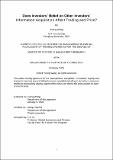Does Investors’ Belief on Other Investors’ Information Acquisition Affect Trading and Price?
Author(s)
Wang, Yuting(Economist)
DownloadThesis PDF (1.741Mb)
Advisor
Weber, Joseph
Terms of use
Metadata
Show full item recordAbstract
I study how investors’ belief on other investors’ information acquisition about an asset affects trading and price, holding constant investors’ actual information acquisition. I hypothesize that the predictions depend on the trading strategy investors adopt, which is essentially determined by the nature of the asset and the level of investor sophistication. In a world where investors are able to form high-quality independent estimates of the fundamental asset value, they extract other investors’ signals from the price change and end up trading more aggressively on their private signals when they believe there have been more information acquirers. In contrast, in a world where investors cannot form high-quality independent estimates of the asset value, they tend to adopt a heuristic strategy and trade less aggressively on their private signals when they believe there have been more information acquirers. Using comprehensive private meetings data in China from 2007 to 2017 and a mandate by the Shenzhen Stock Exchange in 2012 that requires firms to disclose the dates and participants of private meetings within two trading days, I find that investors on average trade less aggressively when they believe there have been more information acquirers, consistent with the heuristic world. The results are concentrated in firms with high information uncertainty, e.g., firms with high market-to-book and volatility, which approximate a world where investors are less likely to have a high-quality fundamental anchor, supporting my theoretical mechanisms.
Date issued
2024-02Department
Sloan School of ManagementPublisher
Massachusetts Institute of Technology